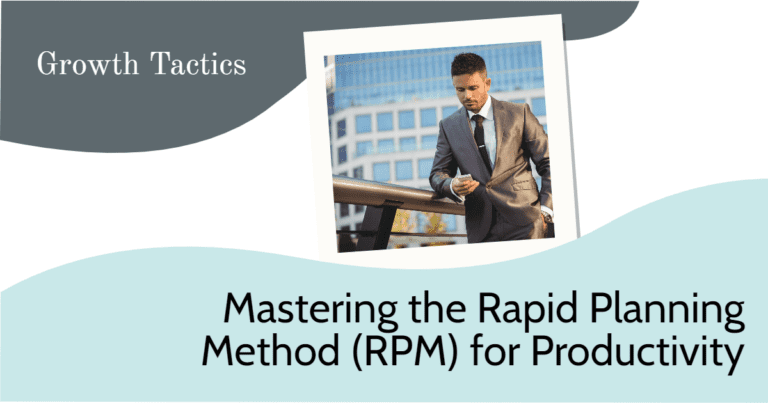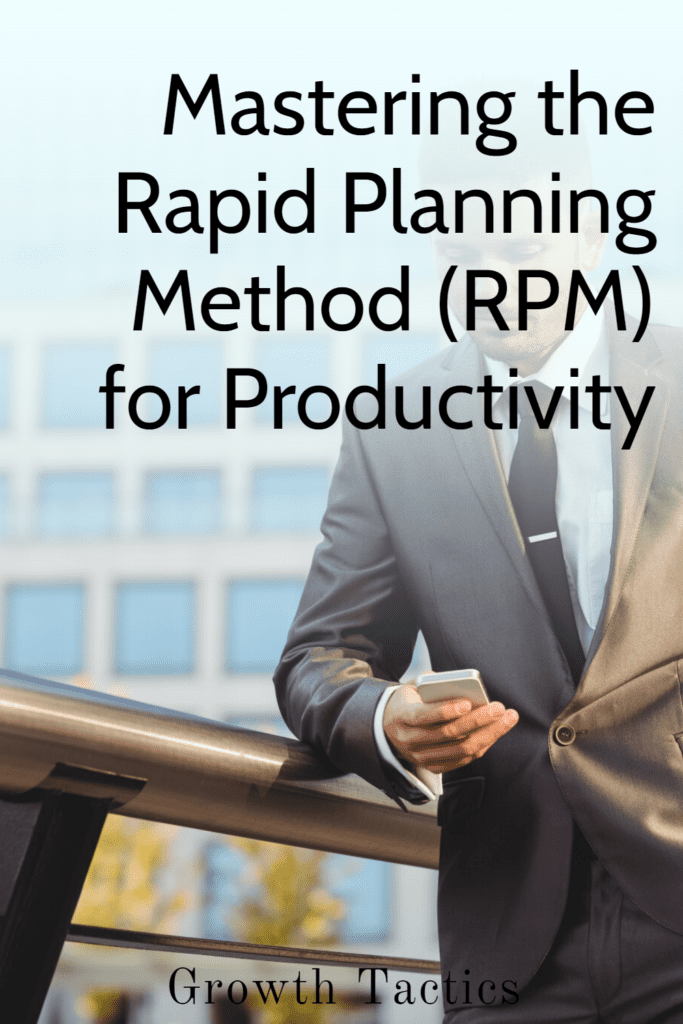Are you tired of feeling like you never have enough time in the day? Do you find yourself struggling to stay focused and reach your goals? Well, you’re in luck because we have the solution for you. The Rapid Planning Method (RPM).
Jump To Section
Brief History of the RPM
The Rapid Planning Method (RPM) was developed by Tony Robbins, a renowned motivational speaker and life coach. It is a goal-setting and productivity system that aims to help individuals achieve their desired outcomes more efficiently. The method has its roots in Robbins’ extensive research and experience in personal development. RPM follows a specific structure, focusing on the results a person wants to achieve in different areas of their life and breaking them down into actionable steps. By using RPM, individuals can prioritize and manage their time effectively, leading to greater productivity and fulfillment.

Understanding the Rapid Planning Method Process
Let’s dive right into understanding what the RPM is all about. At its core, the RPM is a powerful planning method designed to help you achieve your goals. It’s a new way of thinking. It’s a systematic approach that involves five key steps. Let’s break them down:
Step 1: Identify Your Primary Focus
The first step of RPM is all about identifying your primary focus. This means figuring out exactly what matters most to you. It could be your career, your relationships, your health, or even a personal passion project. Take a moment to reflect on what truly lights a fire in your soul.
For example, if your primary focus is your career, you might set specific goals related to promotions, skill development, or launching a business venture.
Step 2: Determine Your Outcomes
Once you have your primary focus in mind, it’s time to determine your outcomes. These are the specific and measurable goals that will help you make progress in your primary focus area. Take some time to think about what you want to achieve and write it down.
Remember, outcomes should be specific and actionable. Instead of saying “I want to be healthier,” consider setting a goal like “I will exercise five days a week and cook nutritious meals at home.”
Step 3: Uncover Your Purpose
Now that you have your outcomes in place, it’s important to understand the purpose behind them. This step involves digging deep and figuring out the underlying reasons why you want to achieve these goals. What drives you? What impact do you want to make?
By connecting your goals to a deeper purpose, you’ll find greater motivation and a stronger sense of fulfillment when you achieve them.
Step 4: Create a Massive Action Plan (MAP)
Once you have your outcomes and purpose established, it’s time to create a Massive Action Plan (MAP). This is where you break down your goals into actionable steps.
Think of your MAP as a roadmap that will guide you toward your desired outcomes. Break each goal into smaller tasks and create a timeline for completing them. This will help you stay organized and focused on what needs to be done.
Step 5: Establish Accountability Systems
Finally, accountability is key to staying on track with your goals. Establishing accountability systems will help you stay motivated and ensure you’re making progress.
Consider finding an accountability partner, using apps or tools to track your progress, or even publicly committing to your goals. Whatever works best for you, make sure you have a system in place to hold yourself accountable.

Implementing the RPM Method for Increased Productivity
Now that you understand the RPM process, it’s time to put it into action. Here are some tips to help you implement the RPM method effectively:
Use of the RPM Daily Planner
The RPM method is made even more powerful with the use of a daily planner specifically designed for this system. It allows you to structure your day, track your progress, and stay focused on your goals.
Make sure to utilize the different sections of the planner, such as the goal tracker, daily schedule, and notes section. Take some time each day to fill it out and update your progress.
Incorporating the RPM Method into Your Routine
Consistency is key when it comes to planning. Find a routine that works for you and incorporate the RPM method into your daily life. Whether it’s in the morning, during lunch breaks, or before bed, set aside dedicated time to plan and review your goals.
By making the RPM method a part of your routine, it becomes second nature, allowing you to achieve higher productivity and reach your desired outcomes.
Success is not measured by how much you do, but by how effectively you do it. 🚀 Boost your productivity and become a true master of #RPM with this ultimate guide: #ProductivityHacks #BreakthroughGoals
Benefits of Mastering RPM
So, why should you invest your time in mastering the RPM method? Let’s take a look at some of the benefits:
Increased Productivity
By prioritizing your primary focus and implementing the RPM method, you’ll find yourself becoming more productive. With a clear plan and defined outcomes, you’ll know exactly what needs to be done, reducing decision fatigue and increasing efficiency.
Imagine how satisfying it will feel to check off tasks from your Massive Action Plan and make progress toward your goals every single day.
Enhanced Goal Achievement
The RPM method is designed to help you achieve your goals. By breaking them down into smaller, actionable tasks, you’ll find yourself making consistent progress. As you review and adjust your MAP regularly, you’ll stay on track and continue moving closer to your desired outcomes.
Don’t just take our word for it, though. Countless individuals have attributed their success to the RPM method, from entrepreneurs launching their dream businesses to students acing their exams.
Improved Time Management
Time management can be a challenge, especially when juggling multiple goals and responsibilities. However, by implementing the RPM method, you’ll become a master of allocating your time effectively.
With the RPM daily planner, you can schedule your day, block out time for important tasks, and avoid time-wasting activities. Say goodbye to procrastination and hello to optimized productivity.
Overcoming Challenges in Using RPM
While the RPM method is highly effective, it’s important to acknowledge and address potential challenges that may arise as you implement it. Here are a couple of common hurdles and ways to overcome them:
Initial Resistance and Adaptation
Adopting any new planning system can feel overwhelming at first. You may face resistance or skepticism about whether the RPM method will work for you.
The key here is to start small. Begin by implementing one aspect of the RPM method, such as identifying your primary focus. Gradually incorporate other steps until you have mastered the entire process, adapting it to fit your unique needs.
Accountability Struggles
Accountability is crucial for achieving your goals, but it’s not always easy to hold yourself accountable. You may find yourself slipping up or becoming complacent.
One technique to combat this is finding an accountability partner. Share your goals with someone you trust and regularly check in with each other. Alternatively, use apps or tools that track your progress and send reminders. Remember, accountability can greatly contribute to your success.

Useful Tools for Implementing the RPM
Digital Note-Taking Apps
First things first, let’s kick off our list with a game-changer: digital note-taking apps. When it comes to organizing your thoughts, ideas, and goals, these apps are invaluable. Whether you prefer Evernote, Microsoft OneNote, or Google Keep, these digital wonders allow you to capture and categorize your plans quickly and efficiently. Plus, with their synchronization capabilities, you can access your notes from anywhere, on any device!
Goal Setting Worksheets
Now that you have your note-taking app ready, let’s move on to SMART goal setting. One of the basic principles of RPM is defining goals that are specific, measurable, achievable, relevant, and time-bound. To ensure you stay on track, try using printable goal-setting worksheets. These templates provide a clear structure to outline your objectives and ensure you’re setting yourself up for success. With your goals visually laid out, you’ll have a clear roadmap to follow!
Time Tracking Software
Time is a precious resource, my friend. And managing it effectively is key to mastering RPM. That’s where time tracking software comes in. Tools like Toggl, RescueTime, or Harvest can help you analyze how you spend your time and identify areas for improvement. By knowing where your time goes, you can eliminate distractions, optimize your routines, and make every minute count. So track away and watch your productivity skyrocket!
Digital Kanban Boards
Visualizing your projects and tasks in a simple and intuitive way is crucial for your RPM journey. Enter digital Kanban boards. Whether you choose Trello, Asana, or Monday.com, these tools will revolutionize your planning process. With boards, lists, and cards, you can easily track your progress, move tasks across different stages, and stay in control of your projects. Say goodbye to chaos and hello to organized bliss!
Pomodoro Technique Timer
If you’re not familiar with the Pomodoro Technique, prepare to have your mind blown! This time management method encourages focused work sessions followed by short breaks. It’s the perfect complement to RPM! To get started, grab a Pomodoro Technique timer app or website like Focus Keeper or TomatoTimer. Set your work intervals (usually 25 minutes) and enjoy some guilt-free breaks in between. With this technique, you’ll keep your brain focused and maintain a steady pace throughout your work sessions.
Mind Mapping Software
When it’s time to brainstorm ideas, make decisions, or solve problems, you need a tool that stimulates creativity and promotes clarity. That’s where mind mapping software steps in. With user-friendly options like MindMeister or XMind, you can visually map out your thoughts, identify connections between ideas, and gain a deeper understanding of your plans. So go ahead and unleash your inner genius with mind mapping!
Project Management Software
For those of you tackling larger-scale projects, project management software is an absolute game-changer. Whether it’s Basecamp, Asana, or Wrike, these tools will help you effectively delegate tasks, collaborate with team members, and track project milestones. With features like task assignments, file sharing, and progress tracking, you’ll have everything you need to keep your projects running smoothly.
Daily Planner or Journal
Last but certainly not least, it’s time to bring some old-school charm to your planning process. Don’t underestimate the power of a good old daily planner or journal. Whether you prefer the tactile experience of pen and paper or the convenience of a digital planner app like Day One or Journey, these tools will keep you accountable and consistent. Use them to jot down your schedule, track your progress, and reflect on your daily achievements. Plus, there’s something deeply satisfying about crossing tasks off your to-do list!
In Conclusion
There you have it – the ultimate guide to mastering the Rapid Planning Method (RPM). By understanding the process, implementing it effectively, and embracing the benefits, you’ll be well on your way to turbocharging your productivity and achieving your goals.
So, why wait? Start incorporating the RPM method into your life today and watch as you become the master of your time and accomplishments!


